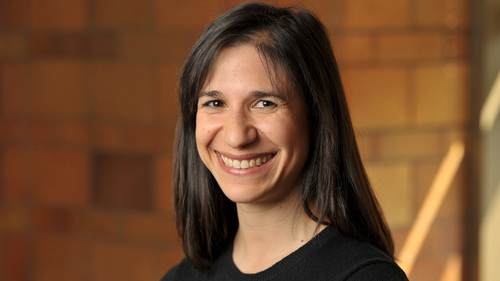
Kristin Valentino is dedicated to understanding how adversity in early childhood — such as chronic poverty or maltreatment — can affect children’s mental and physical health later in life.
And she wants to know how psychologists can best intervene and improve outcomes for those children.
Valentino, the William J. Shaw Center for Children and Families Associate Professor of Psychology at the University of Notre Dame, has been awarded a $2.7 million grant from the National Institutes of Health to continue exploring these issues in her latest project, “Pathways Linking Early Adversity and Support to Behavior and Physical Health.”
This is Valentino’s second multimillion-dollar award from the Eunice Kennedy Shriver National Institute of Child Health and Human Development. The first $3 million grant, awarded in 2013, allowed Valentino to evaluate a new intervention she developed to improve communication between maltreated preschool-aged children and their mothers.
“It is very exciting to have NICHD fund this research and provide continued support to follow these children and families five years after we first started working with them,” Valentino said. “This grant allows us to determine whether our intervention has led to long-term positive benefits for children’s development and health.”
The intervention, which taught mothers how to interact more openly and effectively with their children about past emotional experiences, proved successful. Valentino’s findings demonstrated that it is effective in improving maternal support and is associated with improvements in child cognitive and emotional outcomes.
Because there are very few longitudinal studies of maltreated children — and even fewer that have evaluated intervention effectiveness beyond one year — she is looking forward to examining the intervention’s long-term potential.
“This grant will address important research questions regarding the lasting impact of our intervention and the mechanisms that increase or decrease risk for behavioral and physical health among families,” she said. “It will also have important implications for clinical practice and policies to support children and families involved in the child welfare system.”
The new five-year project will include 240 mother-child groups who participated in Valentino’s previous longitudinal randomized clinical trial when the children were between ages 3 and 6. The families will now participate in two follow-up assessments, one year apart, when the children are between ages 8 and 11.
Given the prevalence of exposure to early adversity and a growing understanding among psychologists of the connections between adversity and both mental and physical health, Valentino chose to add an evaluation of physical health to this project.
“One theory suggests that social support, particularly maternal support, can serve as a buffer to protect children from the effects of adversity on health,” she said. “Much of the research supporting it, however, comes from retrospective reporting of maternal health and correlational designs. In this research, we have a unique opportunity to experimentally test of the role of caregiving support in averting the long-term negative behavioral and physical health consequences associated with early adversity.”
Valentino, who received an initial grant from the College of Arts and Letters’ Institute for Scholarship in the Liberal Arts to pilot the intervention, said that the University’s support has been invaluable.
“Our goals of understanding how early adversity affects development and translating that knowledge into clinical practices and policies to improve the lives of underserved populations are very consistent with the mission of the University,” she said. “And in terms of student interest, faculty support and institutional support, Notre Dame is a great place to do this type of work.”
Originally published by at al.nd.edu on Sept. 24.